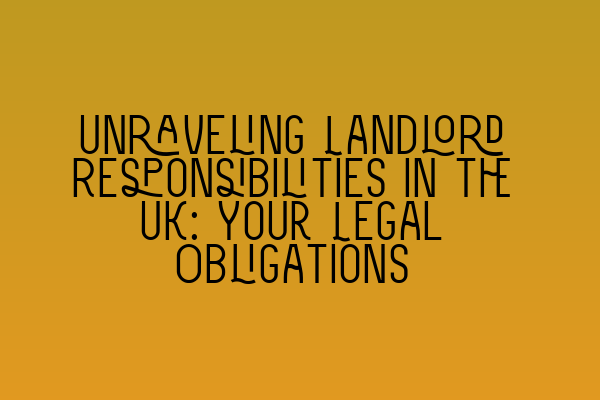Unraveling Landlord Responsibilities in the UK: Your Legal Obligations
Being a landlord in the UK comes with a plethora of responsibilities that must be taken seriously. To ensure a smooth and successful tenancy, it is crucial to understand your legal obligations as a landlord. In this article, we will unravel the landlord responsibilities in the UK and guide you through the essential aspects you need to be aware of.
Renting out Property: Legal Requirements
Before you start renting out your property, there are certain legal requirements that must be met. Failure to comply with these requirements can result in severe consequences, including fines and legal disputes. Here are the key legal responsibilities you need to be aware of:
1. Gas Safety
As a landlord, it is your legal duty to ensure that all gas appliances and flues provided in the property are safe for use. This includes arranging an annual gas safety check conducted by a Gas Safe registered engineer. Failure to comply with gas safety regulations can have serious consequences, including endangering your tenants’ lives and facing legal actions. So make sure you prioritize gas safety.
2. Electrical Safety
Electrical safety is another vital aspect of being a responsible landlord. It is recommended to have an electrician conduct regular checks to ensure the safety of the wiring, sockets, and electrical appliances provided in the property. Although there is no legal requirement for an annual electrical safety check, it is strongly advised to ensure the electrical installations meet the current safety standards.
3. Energy Performance Certificate (EPC)
An Energy Performance Certificate (EPC) is a legal requirement for all rental properties in the UK. It provides information about the property’s energy efficiency and suggests ways to improve it. You must obtain an EPC before renting out your property, and it should be made available to potential tenants. Failure to comply with EPC regulations can result in penalties, so make sure you have a valid EPC.
4. Tenancy Deposit Protection
If you take a deposit from your tenant, you are legally required to protect it in a government-approved tenancy deposit scheme within 30 days of receiving it. This ensures that the deposit is safeguarded and can be returned to the tenant at the end of their tenancy, provided there are no disputes. Failure to protect the deposit properly can lead to legal issues and financial penalties.
5. Mandatory Licensing
In certain areas of the UK, you may be required to obtain a landlord license to legally rent out your property. This is known as mandatory licensing and applies to properties that meet specific criteria, such as being a House in Multiple Occupation (HMO). Make sure you check with your local authority to determine if your property requires a license.
Tenant Safety and Living Conditions
Aside from the legal requirements mentioned above, it is essential to prioritize the safety and living conditions of your tenants. Here are some key aspects to consider:
1. Repairs and Maintenance
As a landlord, you have a responsibility to ensure that the property is maintained in a safe and habitable condition. This includes promptly addressing any repairs or maintenance issues reported by your tenants. Failing to meet your repair obligations can result in legal actions and damage your reputation as a landlord. So, regular property inspections and prompt action are crucial.
2. Fire Safety
Fire safety is a vital aspect of ensuring the well-being of your tenants. You must provide functioning smoke alarms on each floor of the property and carbon monoxide detectors (if there are applicable fuel-burning appliances). It is also advisable to conduct regular fire risk assessments to identify and mitigate potential hazards.
3. Adequate Security Measures
Providing a secure living environment is crucial for the well-being of your tenants. Ensure that the property has secure locks on all external doors and windows. If the property is in a high-crime area, consider installing additional security measures such as an alarm system or CCTV cameras.
4. Healthy Living Environment
A healthy living environment is essential for the well-being of your tenants. Ensure proper ventilation in the property to prevent dampness and condensation issues. Additionally, address any pest infestations promptly to maintain a clean and comfortable living space.
Conclusion
Being a landlord in the UK comes with significant responsibilities. Meeting your legal obligations and ensuring the safety and well-being of your tenants should always be a top priority. By understanding and fulfilling your landlord responsibilities, you can navigate the rental market successfully and establish a positive reputation as a reliable and responsible landlord.
If you’re preparing for a career in property law and land law, check out these related articles:
